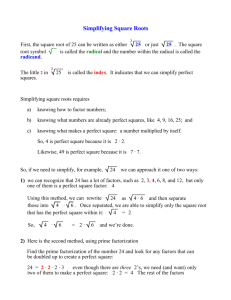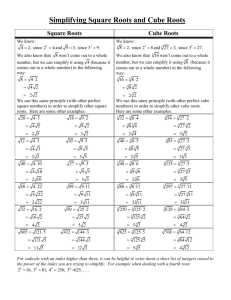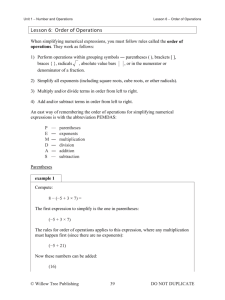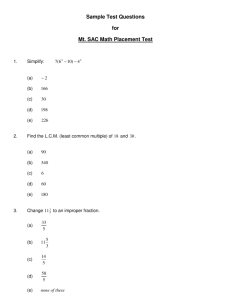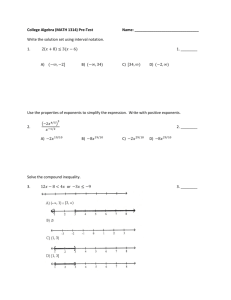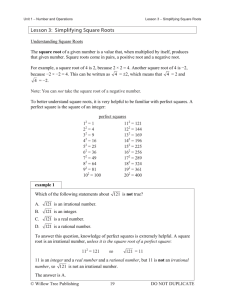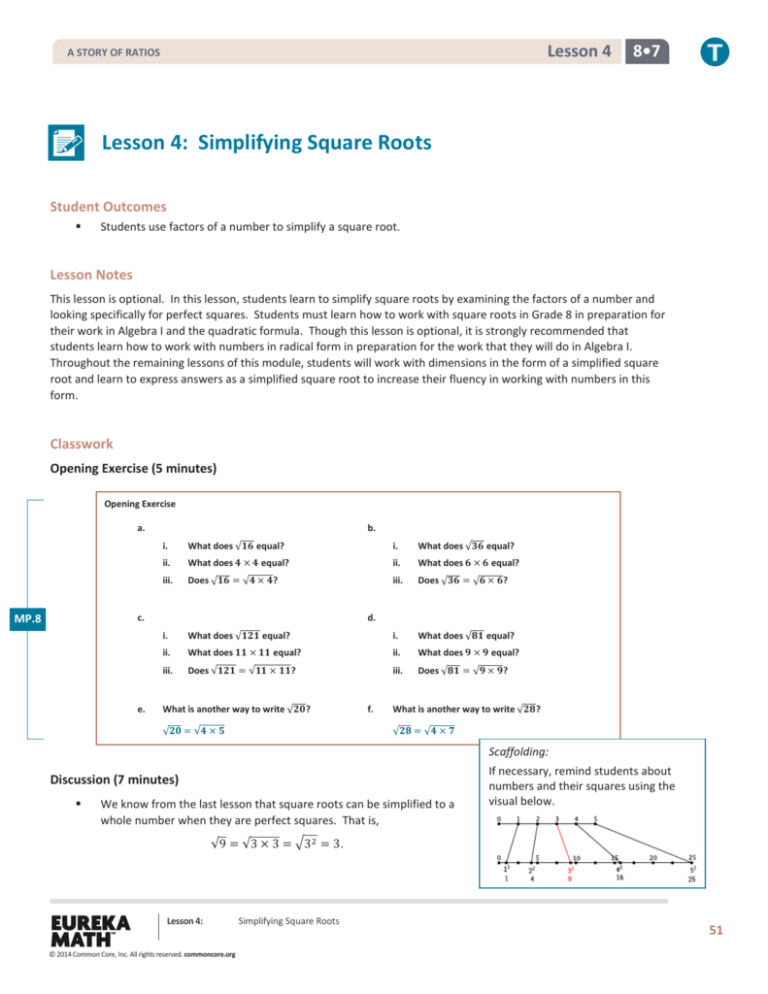
Lesson 4
8
Lesson 4: Simplifying Square Roots
Student Outcomes
Students use factors of a number to simplify a square root.
Lesson Notes
This lesson is optional. In this lesson, students learn to simplify square roots by examining the factors of a number and
looking specifically for perfect squares. Students must learn how to work with square roots in Grade 8 in preparation for
their work in Algebra I and the quadratic formula. Though this lesson is optional, it is strongly recommended that
students learn how to work with numbers in radical form in preparation for the work that they will do in Algebra I.
Throughout the remaining lessons of this module, students will work with dimensions in the form of a simplified square
root and learn to express answers as a simplified square root to increase their fluency in working with numbers in this
form.
Classwork
Opening Exercise (5 minutes)
Opening Exercise
b.
a.
MP.8
i.
What does
ii.
What does
iii.
Does
equal?
×
=
equal?
× ?
What does
ii.
What does
iii.
Does
i.
What does
ii.
What does
iii.
Does
equal?
×
=
equal?
× ?
d.
c.
e.
i.
i.
What does
ii.
What does
iii.
Does
equal?
×
=
equal?
×
?
What is another way to write
=
?
f.
equal?
× ?
What is another way to write
=
×
=
equal?
×
?
×
Scaffolding:
Discussion ( minutes)
We know from the last lesson that square roots can be simplified to a
whole number when they are perfect squares. That is,
9= 3×3=
Lesson 4:
© 2014 Common Core, Inc. All rights reserved. commoncore.org
If necessary, remind students about
numbers and their squares using the
visual below.
3 = 3.
Simplifying Square Roots
51
8
Lesson 4
Given ( is a positive integer and squared is a perfect square), it is easy to see that when =
= that = , where and are positive numbers. In terms of the previous example, when
= 9 = 3 and = 3, then 3 = 3.
and
We can show that this is true even when we do not have perfect squares. All we need to show is that when
and are positive numbers and is a positive integer, that
=
. If we can show that
=
, then we
know that = .
Ask students to explain why
=
implies
they learned in Module 1. For example, since
×
×
×
=
×
×
× , then
Now, for the proof that the
th
of the
root of its factors:
th
= . They should reference the definition of exponential notation that
= × × × and
= × × × , and we are given that
must be the same number as .
root of a number can be expressed as a product
Let =
and =
×
, where and are positive integers and is a
positive integer greater than or equal to 2. We want to show that
=
.
=
=
×
×
×
Scaffolding:
Students may know the term
product in other contexts. For
that reason, students may
need to be reminded that it
refers to multiplication in this
context.
=
=
×
=
×
=
×
×
×
×
×
×
×
×
×
×
×
×
=
Since
=
implies
=
, then
=
×
.
Let’s look again at some concrete numbers. What is 36?
36 = 6
Now, consider the factors of 36. Specifically, consider those that are perfect squares. We want to rewrite 36
as a product of perfect squares. What will that be?
36 = 4 × 9
Based on what we just learned, we can write 36 = 4 × 9 = 4 × 9. What does the last expression
simplify to? How does it compare to our original statement that 36 = 6?
4 × 9 = 2 × 3 = 6; the answers are the same, so 36 = 4 × 9.
Lesson 4:
© 2014 Common Core, Inc. All rights reserved. commoncore.org
Simplifying Square Roots
52
Lesson 4
8
Simplify 64 two different ways. Explain your work to a partner.
64 = 8 × 8 = 8 = 8; the number 64 is a product of 8 multiplied by itself, which is the same as
8 . Since the square root symbol asks for the number that when multiplied by itself is 64, then 64 =
8.
64 = 16 × 4 = 16 × 4 = 4 × 2 = 4 × 2 = 8; the number 64 is a product of 16 and 4. We
can first rewrite 64 as a product of its factors, 16 × 4, then as 16 × 4. Each of the numbers 16
and 4 are perfect squares that can be simplified as before, so 16 × 4 = 4 × 2 = 4 × 2 = 8.
Therefore, 64 = 8. This means that 64 = 16 × 4.
Example 1 (4 minutes)
Example 1
Simplify the square root as much as possible.
=
Is the number 50 a perfect square? Explain.
The number 50 is not a perfect square because there is no integer squared that equals 50.
Since 50 is not a perfect square, when we need to simplify 50, we write the factors of the number 50 looking
specifically for those that are perfect squares. What are the factors of 50?
50 = 2 × 5
Since 50 = 2 × 5 , then 50 = 2 × 5 . We can rewrite 50 as a product of its factors:
50 = 2 × 5 .
Obviously, 5 is a perfect square. Therefore, 5 = 5, so 50 = 5 × 2 = 5 2. Since 2 is not a perfect
square, we will leave it as it is.
The number 50 is said to be in its simplified form when all perfect square factors have been simplified.
Therefore, 5 2 is the simplified form of 50.
Now that we know 50 can be expressed as a product of its factors, we also know that we can multiply
expressions containing square roots. For example, if we are given 2 × 5 , we can rewrite the expression as
2 × 5 = 50.
Example 2 (3 minutes)
Example 2
Simplify the square root as much as possible.
=
Lesson 4:
© 2014 Common Core, Inc. All rights reserved. commoncore.org
Simplifying Square Roots
53
Lesson 4
8
Is the number 28 a perfect square? Explain.
The number 28 is not a perfect square because there is no integer squared that equals 28.
What are the factors of 28?
28 = 2 × 7
Since 28 = 2 × 7, then 28 = 2 × 7. We can rewrite 28 as a product of its factors:
28 =
2 × 7.
Obviously, 2 is a perfect square. Therefore, 2 = 2, and 28 = 2 × 7 = 2 7. Since 7 is not a perfect
square, we will leave it as it is.
The number 28 is said to be in its simplified form when all perfect square factors have been simplified.
Therefore, 2 7 is the simplified form of 28.
Exercises 1–4 (5 minutes)
Students complete Exercises 1–4 independently.
Exercises 1–4
Simplify the square roots as much as possible.
1.
=
×
=
×
=
2.
=
×
=
×
=
=
3.
=
4.
=
×
=
×
=
Example 3 (4 minutes)
Example 3
Simplify the square root as much as possible.
=
Lesson 4:
© 2014 Common Core, Inc. All rights reserved. commoncore.org
Simplifying Square Roots
54
Lesson 4
8
In this example, students may or may not recognize 128 as 64 × 2. The work below assumes that they do not. Consider
showing students the solution below, as well as this alternative solution:
128 = 64 × 2 = 64 × 2 = 8 × 2 = 8 2.
Is the number 128 a perfect square? Explain.
The number 128 is not a perfect square because there is no integer squared that equals 128.
What are the factors of 128?
128 = 2
Since 128 = 2 , then 128 = 2 . We know that we can simplify perfect squares so we can rewrite 2 as
2 × 2 × 2 × 2 because of what we know about the laws of exponents. Then,
128 =
2 × 2 × 2 × 2.
Each 2 is a perfect square. Therefore, 128 = 2 × 2 × 2 × 2 = 8 2.
Example 4 (4 minutes)
Example 4
Simplify the square root as much as possible.
=
In this example, students may or may not recognize 288 as 144 × 2. The work below assumes that they do not.
Consider showing students the solution below, as well as this alternative solution:
288 =
(144 × 2) = 144 × 2 = 12 × 2 = 12 2.
Is the number 288 a perfect square? Explain.
The number 288 is not a perfect square because there is no integer squared that equals 288.
What are the factors of 288?
288 = 2 × 3
Since 288 = 2 × 3 , then 288 = 2 × 3 . What do we do next?
Use the laws of exponents to rewrite 2 as 2 × 2 × 2.
Then, 288 is equivalent to
288 = 2 × 2 × 2 × 3 .
What does this simplify to?
288 = 2 × 2 × 2 × 3 = 2 × 2 × 3 × 2 = 2 × 2 × 3 × 2 = 12 2
Lesson 4:
© 2014 Common Core, Inc. All rights reserved. commoncore.org
Simplifying Square Roots
55
8
Lesson 4
Exercises 5–8 (5 minutes)
Students work independently or in pairs to complete Exercises 5–8.
Some simpler problems are
included here.
Exercises 5–8
5.
Scaffolding:
Simplify
.
=
×
=
×
=
Simplify 12.
12 = 2 × 3
×
×
=
=
2 × 3
=2× 3
6.
Simplify
.
=
×
=
×
=
=2 3
×
Simplify 48.
×
48 = 2 × 3
=
Simplify
.
=
×
=
×
=
=
=2×2× 3
×
=4 3
×
=
8.
Simplify 350.
=
Simplify
.
=
=
2 × 2 × 3
×
350 = 5 × 2 × 7
×
×
×
×
×
×
=
×
5 × 2× 7
= 5× 2× 7
=
= 5 14
Closing (3 minutes)
Summarize, or ask students to summarize, the main points from the lesson:
We know how to simplify a square root by using the factors of a given number and then simplifying the perfect
squares.
Lesson Summary
Square roots of non-perfect squares can be simplified by using the factors of the number. Any perfect square
factors of a number can be simplified.
For example:
=
×
=
×
=
×
=
×
=
Exit Ticket (5 minutes)
Lesson 4:
© 2014 Common Core, Inc. All rights reserved. commoncore.org
Simplifying Square Roots
56
Lesson 4
Name
Date
Lesson 4: Simplifying Square Roots
Exit Ticket
Simplify the square roots as much as possible.
1.
24
2.
338
3.
196
4.
2420
Lesson 4:
© 2014 Common Core, Inc. All rights reserved. commoncore.org
Simplifying Square Roots
8
Lesson 4
8
Exit Ticket Sample Solutions
Simplify the square roots as much as possible.
1.
=
×
=
×
=
2.
=
×
=
×
=
=
3.
=
4.
,
=
×
=
×
=
×
×
×
×
=
Problem Set Sample Solutions
Simplify each of the square roots in Problems 1–5 as much as possible.
1.
=
×
=
×
=
2.
=
×
=
×
×
=
=
3.
=
=
4.
=
=
×
×
×
×
×
×
×
=
5.
=
×
=
×
=
×
×
×
×
×
=
Lesson 4:
© 2014 Common Core, Inc. All rights reserved. commoncore.org
Simplifying Square Roots
58
Lesson 4
6.
8
What is the length of the unknown side of the right triangle? Simplify your answer, if possible.
Let represent the length of the hypotenuse.
+
=
+
=
=
=
×
=
=
What is the length of the unknown side of the right triangle? Simplify your answer, if possible.
Let represent the length of the hypotenuse.
+
=
+
=
=
=
=
8.
What is the length of the unknown side of the right triangle? Simplify your answer, if possible.
Let represent the length of the hypotenuse.
+
+
=
=
=
=
=
×
=
=
Lesson 4:
© 2014 Common Core, Inc. All rights reserved. commoncore.org
Simplifying Square Roots
59
Lesson 4
9.
8
What is the length of the unknown side of the right triangle? Simplify your answer, if possible.
Let
represent the unknown length.
+
=
+
=
+
=
=
=
=
=
×
=
×
=
×
×
=
10. Josue simplified
as
. Is he correct? Explain why or why not.
=
×
=
=
×
×
×
×
×
=
Yes, Josue is correct because the number
= × × . The factors that are perfect squares simplify to
=
.
leaving just the factor of that cannot be simplified. Therefore,
11. Tiah was absent from school the day that you learned how to simplify a square root. Using
explanation for simplifying square roots.
=
× × . Now, we can use the factors to
=
×
× . Because we want to
because of the laws of exponents. Now, we have
To simplify
, first write the factors of
. The number
=
× × , which can then be expressed as
write
as
×
simplify square roots, we can rewrite the factor
=
×
, write Tiah an
×
×
.
Each perfect square can be simplified as follows:
=
×
=
×
=
The simplified version of
Lesson 4:
© 2014 Common Core, Inc. All rights reserved. commoncore.org
=
×
×
×
×
.
.
Simplifying Square Roots
60


